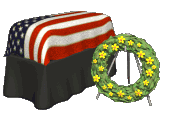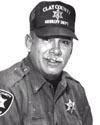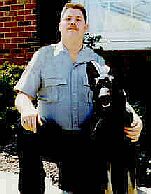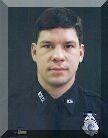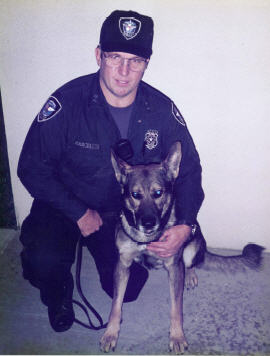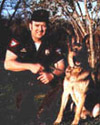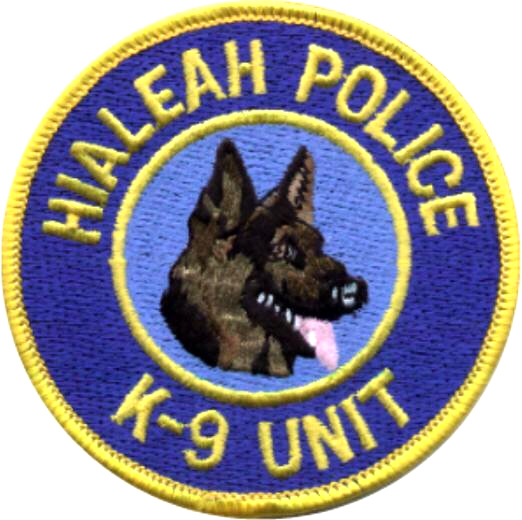|
L.O.D. Deaths |
|
|
1990-1999 Tributes For Police And Military K9 Handlers Note : Some of these tributes are for those that were not line of duty deaths.
Deputy Sheriff James R. "Monk" Kenney, 62, was shot and
killed on November 16, 1999 at approximately 4:00 p.m. as he and
other officers were attempting to arrest 22-year-old Jeffery F.
Hebert at his home in Morganville who was a jail escapee.
After Hebert's court
appearance, Hebert was transferred to the Geary County Jail in Junction
City, where he was held in lieu of $750,000 bond. Jeffery F.
Hebert
was found guilty on all counts January 16, 2004. He waived
his right to contest a sentence below the statutory maximum and
stipulated to the aggravating factors for the purposes of a hard 50
sentence. The jury was unable to reach a unanimous decision in the
sentencing phase of the trial. The trial court found that the defendant
"knowingly created a great risk of death to more than one person" and
that the defendant "committed the crime in order to avoid or prevent a
lawful arrest." Based on these aggravating circumstances, the trial
court sentenced the defendant to life in prison without the possibility
of parole for 50 years on the capital murder charge.
April
29, 1999 - Nashville, Tennessee - Age 26
On April 28, 1999, Officer Michael Richardson, 26, was involved in a serious traffic accident while driving with his K-9 Tossy in their police vehicle while heading home when he struck a bridge on interstate 40. Officer Richardson
succumbed from accident related injuries the following day, April 29,
1999. Tossy only received minor injuries. Officer Richardson was a 3 1/2
year veteran of the department in Nashville Tennessee. Prior to working
for the Nashville International Airport Department of Public Safety,
Officer Richardson was employed by the So. Carthage, TN Police
Department. His service with the airport included police, airport rescue
fire fighting and emergency medical treatment. In January 1998 Officer
Richardson was selected as the department's first K-9 Handler under a
joint program with the Federal Aviation Administration. Mike quickly
established a standard of performance that is renowned in the industry.
Mike Richardson was a friend to everyone with a special love for dogs
and horses. He is survived by his wife Tammy and two young daughters.
An Officer Mike Richardson Memorial Fund is being established to erect a
permanent memorial at the entrance of the Nashville International
Airport Department of Public Safety. Donations will be received by the
department at 921 Airport Service Road, Nashville, TN 37214.
Chief of Police Duncan,
56, was killed in a head-on collision on August 13, 1998 while driving
his canine unit. His canine loyally stayed with him until rescue units
arrived. He had been in law enforcement for 28 years. He served with
the Decatur Police Department in Arizona.
Deputy Michael Metroka, 39,
served Broward Sheriff's Office in Florida for 10 years. In 1996 he
became a K-9 deputy. While on duty on November 29, 1997, Deputy Metroka
was struck in his vehicle by a hit and run driver using a rented 1997
Mercury Sable driven by Michael Lee Brown, 26, who slammed into his 1994
Ford Explorer near Pompano Beach at 12:14 a.m. His canine partner "Woedon",
a Belgian Malinois, was with him when the crash occurred. Metroka's
Explorer struck a curb and overturned near Copans Road and Northeast
First Avenue. The dog survived the impact and remained at Deputy
Metroka's side until he could be extracted from the wreckage. The
suspect, a convicted felon, got out of his vehicle and approached the
cruiser before fleeing the scene after removing a gun from his wrecked
rental car. K9 Woedon, Deputy Metroka's partner, exited the vehicle and
chased the suspect before returning to stay with him until rescue crews
arrived. Deputy Metroka succumbed to his injuries fourteen days later on
December 15, 1997 at 2:00 p.m. Approximately 300 people attended his
funeral. K9 "Woeden" was then retired and given to his surviving wife
Donna.
Officer Frank Balzano November 14, 1997 - Chicago, Illinois - Age 65
Officer Frank Balzano, 65, was working at Harlem Irving Plaza , on November 13, 1997, when he was assaulted and died the next day from his injuries. Officer Balzano fell during an altercation with several suspects, striking his head. Officer Balzano tried to break up an argument between Amy Landers and another girl and was trying to usher out the violent, combative teenage girl when she began screaming for her boyfriend to punch him. Without saying a word, Zbigniew Krzeczkowski punched Balzano on the right side of Officer Balzano's face. Officer Balzano was knocked out and fell backwards, striking his head and never regaining consciousness." Amy Landers, 17, and her boyfriend, Zbigniew Krzeckowski, 16, both of Chicago, were indicted on multiple charges which include: first-degree murder, aggravated battery, battery, reckless conduct, mob action and disorderly conduct. Zbigniew Krzeckowski was charged as an adult. Both pleaded not guilty to first-degree murder charges. Officer Balzano had served with the Chicago Police Department for 39 years and was planning on retiring in six weeks. The last six years Officer Balzano and his K9 partner “Max”, a yellow Labrador retriever, worked in the bomb detection unit at O'Hare International Airport. Officer Balzano had been a K9 officer for 25 years. Mr. Balzano had received 43 commendations in his police career. Mr. Balzano was an Army veteran of the Korean War. His K9 “Max” attended his funeral and then went to live with Balzano's family. Approximately 400 mourners attended services for Balzano. Mr. Balzano was an Army veteran of the Korean War. He was survived by his wife Jean, sons Frank Jr., Dan and daughter Cathy Zak.
On March 9, 2000 a mistrial was declared because of comments Judge Earl Hoffenberg made before the trial ended when he made faces and lashed out at Amy Landers and Zbigniew Krzeckowski. On June 12 a new judge, John J. Scotillo, heard guilty pleas from Amy Landers and Zbigniew Krzeckowski to involuntary manslaughter which was less than the original charge of first degree murder. Zbigniew Krzeckowski was sentenced to four years in prison. Amy Landers was sentenced to 30 months probation and must complete 130 hours of community service plus attend anger management classes.
Sergeant Godwin, 32, was killed May 22, 1997 in an accident while responding to a call involving a disgruntled employee with a gun at a limousine service company. This call was the second time officers had been dispatched to the scene. While en route with his unmarked Range Rover he collided with a Honda driven by Patricia Ettson of Apex. The police vehicle rolled over at the intersection killing Sergeant Goodwin. Ettson was not injured. The crash occurred as Ettson pulled into the intersection of McCrimmon Parkway and Church Street in Morrisville. Ettson told authorities she had come to a complete stop before proceeding north on McCrimmon. Police said Godwin was driving west on Church Street. She said she heard no siren and saw no flashing lights, even thought the Range Rover was equipped lights and siren. Construction workers near the scene of the accident said they heard no siren before the car and Range Rover collided. His canine partner, Gray, survived the accident. Godwin's canine partner was not injured and the dog jumped out of Godwin's vehicle and ran back to the town police station. Sergeant Godwin had served with the Morrisville Police Department in North Carolina for 9 years. Approximately forty canine officers and their K9'S attended the funeral service. Sergeant Goddwin's K-9 Partner Gray retired shortly after the accident and went to live with the Godwin family. He is survived by his wife Allison and his 8-month-old daughter Mercedes.
North Carolina Highway Patrol investigated and announced there will be no criminal charges filed in the incident.
Deputy David Michael Demos January 25, 1997 - Milwaukee, Wisconsin - Age 45
Deputy Demos, 45, was struck and killed on 1/25/97 at 5:19 p.m. by a drunk driver, Robert Thomas Urbanec, 38, while assisting a disabled motorist, Youzadik Aziz, on the edge of I-94. Youzadik Aziz was lost and trying to find Potawatomi Bingo Casino and asked Deputy Demos for help. After Deputy Demos Gave Directions, Aziz said he disappeared. Aziz got out of his car to find Deputy Demos on the pavement in front of his cruiser. Deputy Demos was killed instantly from massive head, chest and pelvic injuries. Aziz then called for help. The 37 year old suspect, Robert Thomas Urbanec, then fled the scene but was followed by Charles Mather, who kept in contact with a 911 dispatcher. Mather observed Urbanec just prior to the accident swerving from the right lane into the distress lane and then into the center lane. Mather decided to "get around Urbanec's vehicle in case something happened." As Mather went around Urbanec's truck, he noticed that Urbanec appeared to be sleeping behind the wheel. Mather said that he "continued southbound watching in his rear view mirror, and he noticed the vehicle swerving in the distress lane again." Upon observing this erratic driving , Mather used his cellular phone to call 9-1-1. Mather within moments of contacting the 9-1-1 dispatcher, he noticed Urbanec's pickup truck in the right lane ahead of him and then witnessed Urbanec swerve a third time into the distress lane and hit Deputy Demos, causing him to "cartwheel over the squad car and hit the pavement." Mather proceeded to follow Urbanec while maintaining contact with the 9-1-1 dispatcher. Mather said that Urbanec drove south on I-94 and then headed west on I-894. Urbanec exited at 60th Street, drove south on 60th Street, and immediately re-entered I-894 in the eastbound lanes. Shortly thereafter, City of Greenfield police apprehended Urbanec near the 27th Street exit. When police arrested him miles from the scene in his damaged pickup truck, he told them he did not even know he had been in an accident. At 7:30 p.m. two hours after the accident, Urbanec had a blood alcohol content of 0.17%. Prior to law enforcement Deputy Demos served in the Air Force. Deputy Demos is survived by Vivian, his wife of 25 years, his daughter Michelle, 23, and his son, Christopher, 18.
Robert Thomas Urbanec, a mail carrier, from Arlington Heights, Illinois, was convicted of homicide by intoxicated use of a motor vehicle. Urbanec said he had five beers in twenty five minutes or less at his brothers house. Judge Timothy Dugan sentenced Robert Thomas Urbanec to ten years in prison and five years probation after a jury found him guilty after a week long trial. The judge told Urbanec that he will have to attend Alcoholics Annonymous meetings for one year, give $150 monthly contributions to a scholarship fund in Demo’s name and must make annual visits to Deputy Demo’s grave. He also lost his driving privilages during parole and probation, have his children undergo evaluation for their risks to become problem drinkers, have no contact with the Demo’s family, perform 500 hours of community service, speak quarterly to youths about alcoholism and undergo alcohol treatment.
On June 30, 2008, Around 4:45 p.m., sheriff's deputies respond to a domestic violence complaint at the Manitowoc home Urbanec now shares with his fiancée, Kendy Haese. They are told Urbanec may be drunk, is leaving the home and would be driving a green pickup. A Wisconsin state trooper stops Urbanec near the home. Urbanec fails a field sobriety test and is arrested for operating under the influence. It is a clear violation of his probation, and Urbanec is placed on a probation hold at the Manitowoc County Jail. Two days later, his probation officer and her supervisor drop the hold. On July 2, Urbanec walks out of jail a free man.
Officer David A. Seamens October 20, 1996 - Lowell, Massachusetts - Age 47
Canine Officer David Seamens, 47, of Dracut and a member of the Lowell Police Department died October 20, 1996 along seven other people who died in a plane crash. Others on board the plane from North Reading Police Department in Massachusetts was another canine officer Robert Marchionda, and Lowell Police Department officers Lieut. Steven Smith,40, Donald Brill, 41, and retired Sgt. John Sullivan, 65, who just retired four months earlier and three other men. The pilot, Michael Burns, 39, of Waterville Maine, father and son John Gaffney, 54, and Bart Gaffney, 34. The pilot left Anticosti Island in a twin – engine Piper Navajo with his passengers that were returning from a deer hunting trip. The pilot was heading to Bangor Maine when he radioed the plane was having mechanical trouble. The plane crashed just before noon narrowly missing homes at Eel River Crossing in a New Brunswick field and became a fiery explosion. The pilot was trying to make it to Charlo airport which was only a few miles away. The plane was a charter with Telford Aviation Inc. based in Waterville, but with operations in Bangor. Officer Seamens was a Lowell Police Officer for twenty years. He leaves behind a wife and his son Michael.
Officer Robert M. Marchionda October 20, 1996 - North Reading, Massachusetts - Age 39Canine Officer Robert Marchionda, 39, of Dracut served with the North Reading Police Department and died October 20, 1996 along with seven other people who died in a plane crash. Others on board the plane were Lowell police officers, canine officer David Seamens, 47, Lt. Steve Smith, 40, Officer Donald Brill, 41,and retired Sgt. John Sullivan, 65, who just retired four months earlier and three other men. The pilot, Michael Burns, 39, of Waterville Maine, father and son John Gaffney, 54, and Bart Gaffney, 34. The pilot left Anticosti Island in a twin – engine Piper Navajo with his passengers and were returning from a deer hunting trip. The pilot was heading to Bangor Maine when he radioed the plane was having mechanical trouble. The plane crashed just before noon narrowly missing homes at Eel River Crossing in a New Brunswick field and became a fiery explosion. The pilot was trying to make it to Charlo airport which was only a few miles away. The plane was a charter with Telford Aviation Inc. based in Waterville, but with operations in Bangor. From 1977 to 1982 officer Marchionda served on the North Reading police force. He moved to the Miami Beach Police Department from 1982 to 1986. Officer Marchionda then returned to the North Reading police, serving as the canine officer. He is survived by his wife and son.
Senior Patrol Officer Dick Vernon Hobson Jr. June 10, 1996 - Tulsa, Oklahoma - Age 45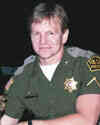
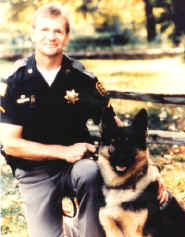
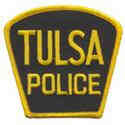
Officer Hobson, 45, was shot and killed June 10, 1996 and another officer was shot and wounded in the leg after responding to the scene of a robbery. At 2135 hours three men robbed a fast food restaurant at 1400 South Peoria. Shortly after the three robbers fled, a stolen white Mitsubishi was wrecked on I-44 near the scene of the robbery. A man was seen running from the wrecked car with a rifle. A short time later, Tulsa K-9 Officer Steve Downie, 38, was summoned to a dark alley about a mile from the crime scene to search for a possible suspect. Downie parked at the intersection of 3rd and Greenwood and exited his car, hoping to deploy his K-9. Downie recognized one of the officers on scene as Officer Jim Leach who explained that he'd seen some movement in the alley. The two officers decided to drive through the alley. Leach's car with lights on was the lead and Downie's blacked-out unit trailed. After traveling the length of the alley without seeing anything, Downie got his dog out of the cruiser just as fellow K-9 officer, Dick Hobson, arrived with his dog, Dino. Given the relative inexperience of Downie's K-9, Hobson suggested securing Downie's dog and using K9 Dino, a German Shepherd, to conduct the search. The two men stared down the alley. The rear wall of a brick building formed the east side of the alley, while heavy vegetation draped over an eight-foot-high chain link fence on its west side. The foliage was an ideal place for hiding. As they searched, the suspect jumped out from behind a bush and shot Officer Hobson who was not wearing his vest in the chest and Officer Downie was shot in the leg with a 20 gauge shotgun. At the far end of the alley, Officer Jack Pike joined Downie at the corner of the building. Pike asked for Downie's flashlight and darted into the alley, taking cover behind the telephone pole nearest Hobson. Officer Pike tried to extricate Hobson from the alley while Officer Walt Milner moved up to join Downie with a shotgun. Pike and Milner simultaneously illuminated the alley. The officers could now see the suspect, Steven Michael Williams, 21, some 40 feet away from Pike and leaning against a black steel plate that jutted from the building at its opposite end. Williams had a shotgun in his hands and a .22 revolver in his belt. The shotgun had malfunctioned and Williams was determined to clear it rather than retreat or transition to his revolver. That would prove a costly tactical decision. Pike, Leach, and Milner opened fire on Williams, who continued to desperately wrestle with the shotgun even as bullets struck his body. Williams went down. Corporal Harold Adair grabbed Downie and assisted him out of the alley while K9 Dino covered Officer Hobson's body and would not let anyone near him. Hobson later died at about 5:00 a.m. K-9 Dino never was hit after attacking the suspect despite the fact that some 54 rounds were fired between Williams and the officers, including Hobson, who emptied his magazine. Williams suffered wounds to his thigh, hamstrings, chest, and face. "He was hit 18 times with a combination of .40 caliber and 00 buck shotgun rounds. Officer Downie recovered from his wound months later. Neither of Williams robbery accomplices were ever captured or identified. Hobson was assigned to the K9 Unit on June 29, 1985. During most of his career he was partnered with K9 Ronny, a German Shepherd, who was retired by the department March 15, 1995 and remained with the Hobson family as a pet at their home. Hobson began working with a new canine, Dino, May 28, 1995. Dino, Officer Hobson's canine was retired and given to Officer Hobson's family. Hobson had enlisted in the Army on February 28, 1972 and served as a military police officer and was awarded the National Defense Service Medal and was honorably discharged on December 20, 1983. In 1983 Officer Hobson was awarded a departmental life-saving award for temporarily reviving a premature baby. Hobson was called to the home of a woman who had just given birth prematurely. The infant was assumed dead until Hobson saw it move slightly. He performed mouth-to-mouth resuscitation and kept the baby alive until an ambulance arrived. Hobson then drove the ambulance to the hospital while paramedics worked with the mother and child. The infant later died at the hospital. Officer Hobson, served Tulsa Police Department in Oklahoma for 18 years. Hobson was posthumously awarded his Department's Purple Heart and Medal of Honor, as well as those of the Oklahoma Association of Chiefs of Police. Downie received the same recognitions. Pike, Milner, and Leach each received the Medal of Valor from the Tulsa Police Department and the Oklahoma Association of Chiefs of Police. He is survived by his wife Ann E. Bartoloni and two children, 18 year-old daughterJericho and 8 year-old son Drew.
Trooper Griffith, 34 was killed on April 16,1996 heading south on Route 1 when his cruiser was struck by a F.J. O'Hara Co ice truck. Trooper Griffith was making a U-turn on a two lane road in pursuit of a speeding vehicle and did not see the truck which struck his cruiser on the driver side door. The driver of the ice truuck, Donald Tabbott, 24, was carrying a full truck load of ice when he struck Trooper Griffith's cruiser. He was pronounced dead at the scene. Griffith apparently noticed a vehicle approaching him pull out and pass the Saab, which was operated by Peter Robison, 40. When Griffith braked his cruiser and U-turned to pursue that vehicle, the crash occurred. Witnesses didn't know the make or color of the other vehicle, but they believe a female was driving. Trooper Griffith was a canine officer whose dog was slightly injured in the accident. Griffith was a judo expert and had just returned to active duty April 1 after an knee injury sustained during a judo demonstration disabled him for several months. Trooper Griffith was with the Maine State Police for 10 years. Approximately one thousand people attended his funeral. Trooper Griffith was cremated after the service. Trooper Griffith was survived by his wife, Kate Braestrup, who is a well noted author and four children.
K9 Officer Barta, 29, was shot and killed August 3, 1995 while searching for a work release suspect. Edmond E. Travis III, age19. About 30 minutes into his afternoon shift Barta's first assignment had him joining three other police officers to help track down Travis who was wanted on an arrest warrant for absconding from a prison work-release program from the Buffalo Correctional Facility in Alden on June 15, 1995 and would have been eligible for parole in a September of 1995. Travis prison term had been tied to a burglary conviction. Travis who had been charged with a 1994 burglary, had been in prison for 10 weeks on a 1 1/2 to 4 1/2 year sentence when he was accepted in the work release program. The officers were called to check out a residence at 125 Liberty St. after being notified Travis had been sighted on the porch. Barta drew his weapon and went into the house. Two patrolmen waited outside the front, and another two were in the back. Each officer was clad in a bulletproof vest. Joined by fellow officers, Barta checked out a room on the right side of a first-floor apartment. That's when Travis appeared from out of a closet in that room and fired four shots. One shot went wild. Another shot went through two walls and hit a dog. Two of Travis' gunshots hit Barta. The backup officer who went in with Barta fired four shots as well. That same officer fired a fifth and final round outside the building as Travis fled across the street. Those gunshots missed. More than 200 patrol units and 100 investigators searched for Travis around Binghamton and the surrounding area following Barta's shooting. After seven hours, and tipped off by neighbors, police found Travis in a Frederick Street house a block away from the crime scene. Around 10 p.m., officers chased him from the basement to the second floor. Travis committed suicide four hours later by shooting himself with a handgun after the house he was in was surrounded by officers as they closed in near the shooting site. Barta began four years of service in the U.S. Marine Corps and was a military patrolman, He joined the Binghamton Police Department in 1991. During his time as a patrolman, Barta was part of the canine unit. He worked with a Rottweiler named Ben. Officer Barta’s K-9 partner, Ben, attended the funeral service along with over 3,000 mourners. Officer Barta served with the Binghamton police Department in New York for four years . Patrolman Barta is survived by his expectant wife Mary, 6 -year-old son Daniel, and daughter Kellie. His second son was born eight months after his murder.
Agent Louis Pompei June 9, 1995 - San Dimas, California - Age 30
Agent Louis Pompei, 30, was shot and killed on June 9th 1995 while entering a supermarket, Vons, in San Dimas, while off duty at 2030 hours to cash his paycheck and pick up dog food for his K9 “Dios” in his home city. Agent Pompei while in the checkout line attempted to stop a robbery by taking action when the suspects began to threaten the life of a mentally-disabled employee boy who was being pistol whipped. When he tried to help, two robbers shot him in the chest, leg and abdomen, as he traded fire, wounding both who were later arrested at Queen of the Valley Hospital in West Covina. Pompei hobbled to a pay phone and called 911. Emergency personnel found him crumpled beneath the phone when they arrived minutes later. Pompei died two hours later at San Dimas Community Hospital. Agent Louis Pompei started the Glendora Police Department's first canine unit. Born and raised in Pennsylvania, Pompei graduated from Mahanoy City High School in 1982. He went on to earn a Bachelor of Arts degree in criminal justice administration from Mansfield University of Pennsylvania in 1986. He was hired as a police officer trainee by the Glendora Police Department in 1987 and attended the Los Angeles County Sheriffs Academy, graduating on March 4, 1988. He was appointed to the rank of agent in 1995. A memorial to Pompei was erected near the spot where he was killed. Pompei's funeral service drew 2,000 people and he received a 21 gun salute from the state police. Also at the funeral was a bag-piper and bugler. Agent Pompei had been with the agency for eight years and was survived by his fiancée Tracey Taylor-Careaga.
The two robbers, ages 16 and 17 at the time of the crime, were sentenced to life in prison without parole and the getaway driver, Daniel Hernandez, 19, was sentenced to 26 years to life.
Officer John Paul “Bo” Marcellus January 15,1995 – Fort Worth, Texas - Age 44
Officer John Paul Marcellus, 44, of Azle was killed approximately 7:00 p.m. in a vehicle accident on January 15, 1995 while off duty in North Richland Hills, Texas. Officer Marcellus, a Fort Worth police officer, was on his way home from watching the Dallas Cowboys game with his son who he left with his grandmother before leaving in his red Volkswagen which was struck by a truck and run off the road as he drove west on the Northeast Loop of Interstate 820 near Rufe Snow Road. Jimmy Lewis White, 29, a plumber, was arrested when he returned to the scene minutes later after running into two more vehicles. Jimmy White of Gainesville was charged at the time with intoxication manslaughter for suspected of drunken driving in the traffic death of officer Marcellus. Jimmy Lewis White had a previous DWI conviction. And test results indicate that Jimmy Lewis White's blood-alcohol content was 0.25, more than twice the legal level, when the accident occurred with Officer Marcellus. Officer Marcellus was in law enforcement for twenty years. Officer Marcellus leaves behind his wife Rose Mary Marcellus, his son 11 year old son Justin, his daughter Regina Marcellus and his K9 partner “Argo”. His K9 partner was then given to Officer Brad Thompson.
On October 1, 1998, three years after K9 Argo was given to his new handler Brad Thompson an incident unfolded. A Texas State Trooper, Earl Dub Gillum, was on routine patrol at approximately 8:35 p.m. when he spotted a white Ford pickup truck speeding 83 mph in a 55 mph zone. The truck was also weaving in and out of traffic recklessly. As Trooper Gillum approached the vehicle he had just stopped and was within eight feet of the drivers door, the driver, Charlie Edward Cook, 23, rolled down his window and asked the trooper what was wrong and he then fired ten shots from a 22 caliber pistol within three seconds at Trooper Gillum. The first shot struck Trooper Gillum’s hat just above his forehead. The second shot pierced Trooper Gillum’s temple damaging both his eyes. The third, fourth and fifth rounds struck Trooper Gillum’s left forearm, flashlight and clip board. The sixth and seventh rounds hit Trooper Gillum’s left hip and the eighth, ninth and tenth rounds struck him in the back in his vest. As Trooper Gillum stumbled and fell on the roadway, vehicles swerved to avoid hitting him and the suspect drove off. A passerby stopped and used Trooper Gillum’s radio to call for help at 8:37 p.m. Trooper Gillum spent two weeks in Harris Methodist Hospital in Fort Worth and the next 14 months at home. He had six eye surgeries to save and repair his eyesight. He is legally blind in his right eye and his left eye has 20/50 vision. K9 Argo was later tracking the wanted felon, Charlie Cook, in a heavily wooded area when Cook fired three shots, the first shot hitting K9 Argo in the throat. The second and third shots hit Officer Thompson in the thigh and chest. Officer Thompson returned fire striking Charlie Cook. Cook was rushed to a hospital where he died approximately 10:00 p.m. Officer Thompson rushed K9 Argo to the vet where he died the next morning on October 3, 1998. Canine Argo was nine years old and scheduled to be retired in October. Argo is credited with saving the lives of the other officers that were on the scene. Because of his actions, Argo was awarded the Police Cross and the Medal of Valor. Charlie Cook had previous warrants in Tarrant County for aggravated robbery with a firearm, aggravated assault on a public servant, and possession of a prohibited weapon. Cook was also involved in two police car chases, one being over one hour long when a gas station was robbed.
On February 17, 1995 the wife and daughter of officer Marcellus filed suit against Jimmy Lewis White involved in the crash and the club they say served him liquor and were seeking unspecified damages against Jimmy Lewis White and owners of the Bronco's Sports Bar & Grill at the time. On August 10, 1995, Jimmy Lewis White testified that faulty brakes on his pickup, not alcohol, caused the accident when he testified for more than an hour before a 12-member Tarrant County jury. Jimmy Lewis White said he was not intoxicated when he left a Bedford sports bar and got into an accident that killed officer Marcellus. He testified he drank eight or nine beers in about seven hours Jan. 15, the day of the accident. Kathryn Wyatt, 18, testified that she was driving 68 mph when Jimmy Lewis blew by her and struck three cars. Jimmy Lewis’s attorney Robert Rose argued White was not drunk and a day before the verdict, he brought in an expert who gave testimony that test-tube fermentation - not beer drinking - caused his high blood-alcohol level. Defense expert witness John T. Castle told jurors that blood taken from White after the accident surely had been infiltrated by airborne yeast floating in the atmosphere. Yeast, of course, causes sugar to ferment, and that's what it did to the sugar naturally present in White's blood sample. The alcohol found in White's blood, the expert testified, actually grew there after the blood was drawn from White's body. He testified that airborne yeast contaminated Jimmy Lewis White's blood sample, which measured more than twice the legal limit. In closing arguments, Rose told the jury the test must have been flawed. It would take at least 28 beers for White's blood alcohol to register at .25, he claimed; with that much beer in him, White would have been a staggering drunk. Yet the police had reported only a relatively slight appearance of intoxication. The accident, the speeding, the weaving in and out of traffic and the three cars White hit with his truck, Rose argued were all caused by faulty brakes. Jurors acquitted Jimmy Lewis White on August 11, 1995, in a decision that stunned both sides, a jury acquitted Jimmy Lewis White of intoxication manslaughter in the death of Officer Marcellus after four hours of deliberations. On November 8, 1996, in a civil trial, the jury of 10 women and two men concluded after ten hours of deliberations that Jimmy Lewis White - not a Bedford sports bar that served him liquor - was responsible for a car accident that killed Officer Marcellus. They awarded more than $12 million in damages to the officer's mother and daughter. Jurors absolved Bronco Sports Bar & Grill of responsibility in the accident - just minutes after the bar reached an out-of-court settlement in the lawsuit. Jimmy White was ordered to pay $2 million in compensatory damages to the family of Officer Marcellus. Jurors awarded $445,000 to the victim's mother and $645,000 to his daughter, Regina Marcellus and $10 million in punitive damages.
Officer Jones, 36, and his canine, Laser, were shot and killed, August 26, 1994, after being ambushed by the suspect who had murdered Officer Ron Ryan, 29 year-old rookie, earlier in the day. The ambush happened while Officer Jones and his canine were searching for the suspect. The actual events started to unfold approximately 6:55 a.m. when St. Paul dispatch received a call for a check of a person in a vehicle in the lot of the Sacred Heart Church at Sixth and Hope. The first officer arrived at the scene and was called away for another priority call. Officer Ryan volunteered to take the original call. When Officer Ryan approached the suspect’s vehicle he woke the individual. The suspect identified himself via his passport as Guy Harvey Baker, 26, and had a gun hidden under a coat in his hand that he was using as a blanket. Baker, Marine combat veteran, had a warrant out for his arrest and was wanted in Mason City, Iowa, on a parole violation for illegal possession of firearms. Baker began to fire at Officer Ryan repeatedly and was hit three times in the torso and once in the head killing him at 6:58 a.m. Baker then removed Officer Ryan’s service weapon from his holster. He then returned to his vehicle to leave the area but it wouldn’t start. He was able to push it down a hill and get it running. A citizen who witnessed the shooting armed himself and fired three times at the fleeing vehicle hitting it and shattering the rear window. Baker then drove to the rear of a liquor store on Hudson Road, parked the vehicle, and changed his clothing. While Baker was fleeing he began making circular trails and sprinkled lighter fluid across his trail to try to confuse his scent for the police dogs he knew would be tracking him. He also left bits of clothing scattered around in an attempt to confuse the officers. While Baker was fleeing he came upon a garage and ice fishing shack at the rear of 1124 Conway. The ice shack had a crawl space for Baker to crawl underneath and slide up inside without unlocking the door from the outside. The ice shack had a strip of Plexiglas all the way around it for him to observe what was happening around him. Officer Jones had volunteered to come in on his time off to search for Baker with his K-9 partner Laser. Laser had picked up Bakers scent outside the fish shack. The whole time Baker was observing K-9 Laser and Officer Jones. As soon as Officer Jones looked through the window, Baker fired and Officer Jones went down immediately with a fatal head wound at 10:25 a.m. and had no chance to defend himself. Baker then exited the fish house and was attacked by Laser. Baker shot Laser four times. Baker then recovered Officer Jones’s service weapon. Baker then hid under a pile of lumber and rubbish next to a porch at 1129 Euclid. Several officers observed Baker in his hiding place and was placed under arrest. Officer Jones had been with the St. Paul Police Department in Missouri for 16 years. K9 Laser was cremated and buried with Officer Jones. He is survived by his wife Roxanne and two children ages 8 and 6.
Guy Harvey Baker pled guilty to murdering both Officer Ryan and Officer Jones and was sentenced to two life sentences without parole.
Chief of Police Robert Mortell was shot and killed on 2/1/94 after locating three burglary suspects. Holden police requested Chief Mortell and his tracking dog Ginger, a bloodhound, for help in finding suspects who had been running from police after they had broken into homes at 10:45 a.m. which had front doors smashed in and windows broken and ransacked. The burglars were apparently spooked by a UPS vehicle, fled the scene of the housebreaks and got their vehicle stuck in snow. The trio came upon a truck used by several men from the Worcester Water Department who were working in the area. They fired a shot, ordered the workers to the ground and stole the vehicle. When this vehicle also became stuck in snow, they fled on foot. The chief was on his way when he spotted three men fitting the description of the suspects running across Route 31 about a mile from Pine Hill Dam. Chief Mortell turned the corner to the residence where the burglary had occurred, in a fairly wooded area when he spotted one of the suspects. Chief Mortell left his new canine partner who just completed certification in the cruiser and pursued the men into the woods on foot. Pursuing the three men, Mortell was tracking Padgett and Richards. They had split off from Souza who was able to ambush Chief Mortell. Chief Mortell was shot twice and fatally wounded when confronting one of the subjects at gunpoint. The gunman Michael Souza, 25, fired twelve rounds at Chief Mortell striking him twice in the left side of his chest. One round hit his heart and the other round hit his aorta. Even though Chief Mortell was gravely wounded he manages to fire off six shots at Souza but missing him. Paxton police Sgt. Michael Ahearn called on his radio reporting Chief Mortell had been shot. Princeton police Chief Charles Schmohl and West Boylston police detective Francis Glynn tried to comfort Chief Mortell as they transported him to the University of Massachusetts Hospital where he died in the emergency room. One Hundred fifty officers went to the scene of the crime and set up a perimeter to capture the suspects. State Police helicopter with heat seeking cameras were brought in to assist in the search. Two days later, all three were captured. Michael Souza was spotted walking down a road by Paxton police Sgt. Donald Ball and Massachusetts State Trooper James Jaworek and closed in on him from behind with their guns drawn and was ordered by Sgt. Ball to stop but Souza refused to stop or turn around and continued walking away. The officers ended up with a hand to hand combat with Souza and subdued him and were able to get his 9mm pistol away from him which he used to kill Chief Mortell. Richards and Padgett holed up in a vacant house for the night before surrendering in the morning. Chief Mortell served with the agency for 12 years. Chief Mortell was awarded the Medal of Honor by the Massachusetts Police Association and also a Posthumous Commendation by the New England Association of Chiefs. Chief Mortell's K9 Ginger died two weeks later and was said to have died from a broken heart after being lost without Mortell's companionship. Approximately 5,000 people attended his service. He is survived by his wife Pamela, two daughters, Amy Sue, 12, and Erin, 9, and his son Elliot 7.
Michael Souza was convicted of 1st degree murder and was sentenced to life without Parole. His accomplices, Kenneth B. Padgett, 22, and Jamie Richards, 22, were both sentenced fifteen years to life with chance of parole. Richards pled guilty to second degree murder. Padgett, Richards and Souza had dozens of prior convictions. Souza months before had participated in an armed robbery of a Framingham bank. They were involved in armed robberies, assault, and had weapons violations and drug charges against them. By the age of 22, Padgett had been in and out of prison several times. Padgett tested positive for heroin in prison.
Officer Andrew Michael Chelchowski, 37, commited suicide on July 29, 1993. Around 2 p.m. Chelchowski was found in a wooded area across the street from his home in Dale City. He died of a wound to his head. His service pistol was found near his body. In 1977, Andrew Michael Chelchowski became an Alexandria police officer. In June of 1983, he became a member of the K-9 Unit. On March 22, 1989, Officer Chelchowski and his partner Corporal Charles W. Hill were involved in a shoot out which resulted in his partner being killed and Officer Chelchowski being shot in the leg with a shot gun. Officer Chelchowski endured months of recovery and rehabilitation. He returned to light-duty status later that year and assumed his full duties, with his K-9 partner, in 1991. He remained in that assignment until his death in Prince William County. Officer Chelchowski is survived by his wife, Sherry, a former Alexandria police officer, three step-children, Patrick, Stephanie and Joshua.
Officer Todd Wayne Stone January 27,1993 – Clinton, Iowa - Age 29
Officer Todd Wayne Stone, 29, was killed January 27, 1993, in a high speed chase when his patrol car struck a utility pole during the pursuit. Speeds reached up to 80 M.P.H. Another officer initiated the pursuit after seeing a car doing donuts in a residential intersection. Stone and officers in three other squad cars were chasing a car driven by Todd Picha, 21, of Erie, Ill., when the crash occurred at 1:10 a.m. As he was pursuing the vehicle another vehicle pulled between him and the suspect vehicle and hit the utility pole after he swerved to avoid that vehicle. The driver of the car they were persuing, Todd Picha, was arrested four hours later. Officer Stone’s K9 partner “Max”, a Belgian malinois will recover from the injuries he suffered in a car crash that killed his master, but Clinton Police are uncertain whether the canine will be able to resume police work. Officer Stone had served with the Clinton Police Department for 5 years. He was survived by his wife Amy, 3-year-old daughter Casey, and 1 month old son Callen.
Picha was being held on $60,000 bond. Todd Picha pleaded guilty April 22, 1993. On May 27, 1993 Judge David Sivright sentenced Picha to the maximum of five years in prison for vehicular homicide in the death of Officer Stone. Picha was also ordered to pay $187 restitution to the family of police officer Todd Stone.
Game Warden William F. Hanrahan November 21, 1992 – Maine – Age 49
Game Warden Hanrahan suffered a fatal heart attack on November 21, 1992 while investigating reports or drunken hunters in the woods. William Hanrahan had worked for the Maine Department of Inland Fisheries and Wildlife. His wife, four sons and his K9 "Major" survive him.
Sgt. Pedro Antonio Cainas November 19, 1992 – Hialeah, Florida – Age 34 Officer Pedro "Pete" Cainas, 34, was dispatched to a neighbor dispute at 1655 West 44 Place in Hialeah, Florida at approximately 11:05 p.m. on November 13 where he was met by complainant Abel Fernandez. Fernandez had just informed officers that he had engaged in an argument with his neighbor Esteban Quintanal. The officers then went to Quintanal's apartment door and knocked for over two minutes. Quintanal responded by firing a single gunshot through the closed door striking Officer Cainas in the back of the head. Arriving Officers entered Quintanal's apartment and subsequently took him into custody. Quintanal suffered broken ribs and a head wound that required 21 stitches to close during the struggle and his blood alcohol level was 2.5 above the state standard of .10 for intoxication. Officer Cainas lingered in a coma for six days and expired 11:51 a.m. on November 19, 1992 at Jackson Memorial Hospital. Pete started his law enforcement career in 1979 who was hired by Riviera Beach Police Department and worked their undercover narcotics. In 1980, Pete worked for the Miami Springs Police Department nine months before leaving for the Hialeah Police Department. In his ten years working for the Hialeah Police Department, Pete was a K9 Officer and Auto Theft / Burglary Detective. In 1985, Pete continued his legal career and studied law at the University of Miami. He graduated from law school and received his law degree in May of 1991. He worked as a Miami-Dade Assistant State Attorney but, returned to the Hialeah Police Department October 25, 1992. Pete was killed three weeks later on November 19, 1992. Hialeah's main commercial street, W 49 Street, was renamed "Sgt. Pedro Cainas Drive" in 1995. Officer Cainas leaves behind his fiancee, Gilda Reyes.
Cpl. Terence O'Neill May 25, 1991- Mill, Belfast - Age 44 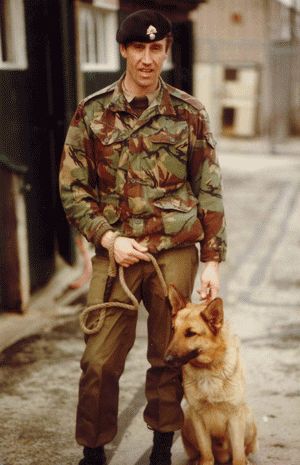
Corporal Terence O'Neill, 44, was killed when a grenade was thrown over the wall of his base. He had just finished feeding his dog and had been speaking with Corporal Darren Swift, another dog handler, when the attack took place. Corporal Swift lost both legs in the explosion. Corporal O'Neill was had served 22 years, and was due to retire from the Army within 6 months.

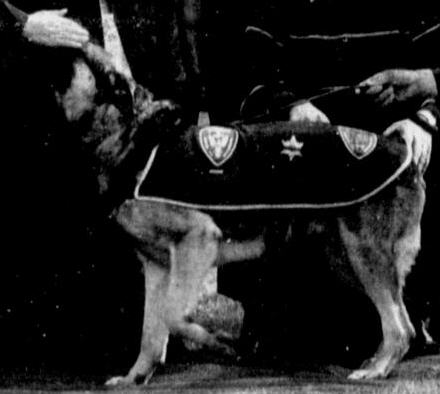

Deputy Sheriff Dennis Wayne Bryant, 30, was killed by a drunk driver who was driving with his head lights turned off on April 22, 1991. Deputy Bryant was responding to backup another deputy who was pursuing a domestic assault suspect. The drunk driver, David Chunn, 30, had just left a local bar after being involved in an altercation and had turned off his lights after seeing the first deputy's patrol car, fearing he would be arrested. The drunk driver struck Deputy Bryan's vehicle head-on and both men were killed. Officer Bryant died at Kennewick General Hospital and David Chunn died at Our Lady of Lourdes Hospital in Pasco. Toxicology reports showed that David Chunn had a BAC of .10 and had smoked marijuana shortly before the incident. Officer Bryant did not have his lights and siren on because the matter was not urgent. Deputy Bryant’s K9 “Hasso” was with him in the vehicle when the crash happened and was slightly injured and was able to attended his masters funeral. Canine “Hasso” was reassigned to another officer. Deputy Bryant had served with the Benton County Sheriff’s Office for almost 4 years and had served in law enforcement for 10 years. Approximately one thousand people attended his funeral. He is survived by his wife, Sim Tok and two daughters. Officer Scott Winters was shot and killed with his own weapon on the evening of July 29th, 1990. The incident unfolded when Thelma Johnson reported that Albert Holland approached her and asked her if she had a hitter (a device used to smoke cocaine). Johnson stated that she did not, but proceeded to lead Holland to a wooded area with the intention of smoking cocaine together. Holland then smoked the first half of his cocaine rock off of a beer can, but Johnson refrained because she did not like that method of smoking. After smoking the second half of the rock, Holland became violent. Holland shoved Johnson to the ground, held her down, and hit her on the side of the head with a bottle while she begged him not to kill her. As Holland beat her, he repeatedly threatened to kill her. Holland ripped Johnson’s shirt and unzipped his pants. Holland forced Johnson to give him oral sex. When Johnson protested and stopped, Holland beat her until she was unconscious. Holland stopped beating Johnson and left the scene when a witness yelled for Holland to stop before he killed her. Johnson had a severed ear, a fractured skull, and multiple cuts on her face, which required extensive plastic surgery. Police officers responded to a call regarding the attack and began the search for the perpetrator. Officer Winters and his K-9 partner, Baron, were searching for a suspect just south of Martin Luther King Boulevard following the rape and beating of a young Pompano Beach woman. Officer Winters was in his patrol car with his K9 partner "Baron" when he asked Holland to approach the vehicle. Officer Winters exited the patrol car and instructed Holland to put his hands on the car. Holland complied with the request. As Winters reached down to use the radio on his belt, Holland turned and took a swing aimed at Winters’ head. A struggle ensued and Winters got Holland in a headlock. Winters repeatedly tried to put Holland on the ground by using his nightstick, but Holland rose and turned, causing the combatants to face each other. Holland kept trying to get Officer Winters gun and at one point Officer Winters was seen pushing Hollands hand down over the gun to try and stop him from removing it. Holland was having a hard time removing the gun from the holster because it was latched. Officer Winters was also seen trying to open his patrol car door to release his canine "Barron" but could not. Holland got a hold of Officer Winters gun when he slid Winters belt with the holster to the front of Officer Winters and was then able to remove it from the holster. When Holland managed to take Winters’ gun he shot the officer twice below his vest before he fled the scene. Officer Winters was shot in the lower stomach and in the groin area. Police officers stated that Winters requested backup at 7:25 p.m. and reported being shot at 7:26 p.m. When officers arrived at the scene, Winters’ gun was missing. Winters died at 8:30 p.m. as a result of gunshot wounds. One of the bullets destroyed his left iliac artery which caused him to bleed to death. Officer Winters was a member of the Pompano Beach Police Department for three years. Officer Winters funeral was attended by two thousand people and 84 canine officers with their canines. Officer Winters was survived by his wife. To make a donation, checks and money orders may be sent to the [Scott Winters] Trust Fund at the Pompano Beach Police Department, 100 SW Third St., Pompano Beach, Fla. 33060.
Albert Holland, 36, was arrested and charged. On 8/16/90 the defendant was indicted for first degree murder, robbery with a firearm, sexual battery and attempted murder with a deadly weapon. On 8/2/91 Albert Holland was found guilty by trial jury on all counts. On 8/12/91 the jury recommended death by a vote of eleven to one. On 8/18/93 Albert Holland was sentenced to death for first degree murder, 17 years for robbery with a firearm, life sentence for sexual battery, and 40 years for attempted murder with a deadly weapon. During Albert Holland's second trial on11/6/96 he was found guilty as charged to first degree murder, robbery with a firearm, and attempted murder with a deadly weapon but was convicted of a lesser charge for attempted sexual battery. On 11/15/96 the jury recommended death by a eight to four vote. On 2/7/97 he was sentenced to death for first degree murder, life sentence for robbery with a firearm, 15 years for attempted sexual battery and 30 years for attempted murder with a deadly weapon. The sentencing judge was the Honorable M. Daniel Futch, Jr.
A second Direct Appeal was filed on 02/20/97. Issues that were raised included whether the trial court erred in denying him the opportunity to represent himself; whether the trial court abused its discretion in denying Holland’s motion to exclude the testimony of the State’s mental health experts; whether the trial court abused its discretion in overruling Holland’s objections to the admissibility of a videotape interrogation of Holland. The Florida Supreme Court found all of the claims either without merit or harmless and affirmed the convictions and sentences, including the sentence of Death, on 10/05/00. A Petition for
Writ of Certiorari was filed on 05/04/01 and denied on 10/01/01. A
3.851 Motion was filed with the circuit court on 09/17/02 and denied
on 05/16/03. A 3.851 Motion Appeal was filed with the Florida
Supreme Court on 06/09/03, raising claims of ineffective assistance
of counsel. On 11/10/05, the FSC affirmed the denial of the
motion. A Petition for Writ of Habeas Corpus was filed with the
Florida Supreme Court on 01/09/04, raising claims of ineffective
assistance of counsel. On 11/10/05, the FSC denied the petition. A
Petition for Writ of Habeas Corpus was filed with the U.S. District
Court, Southern district, on 01/24/06. As of 04/27/07, this
petition was dismissed as untimely filed. A Certificate of
Appealability was granted on 07/18/07. A Petition for Writ of
Certiorari was filed with the U.S. Supreme Court on 02/08/06 and
denied on 04/17/06. A Habeas Corpus Appeal was filed in the U.S.
Court of Appeals, 11th Circuit on 08/01/07 that was
denied on 01/30/09. A Petition for Writ of Certiorari was filed with
the U.S. Supreme Court on 05/13/09. This case is pending. |

